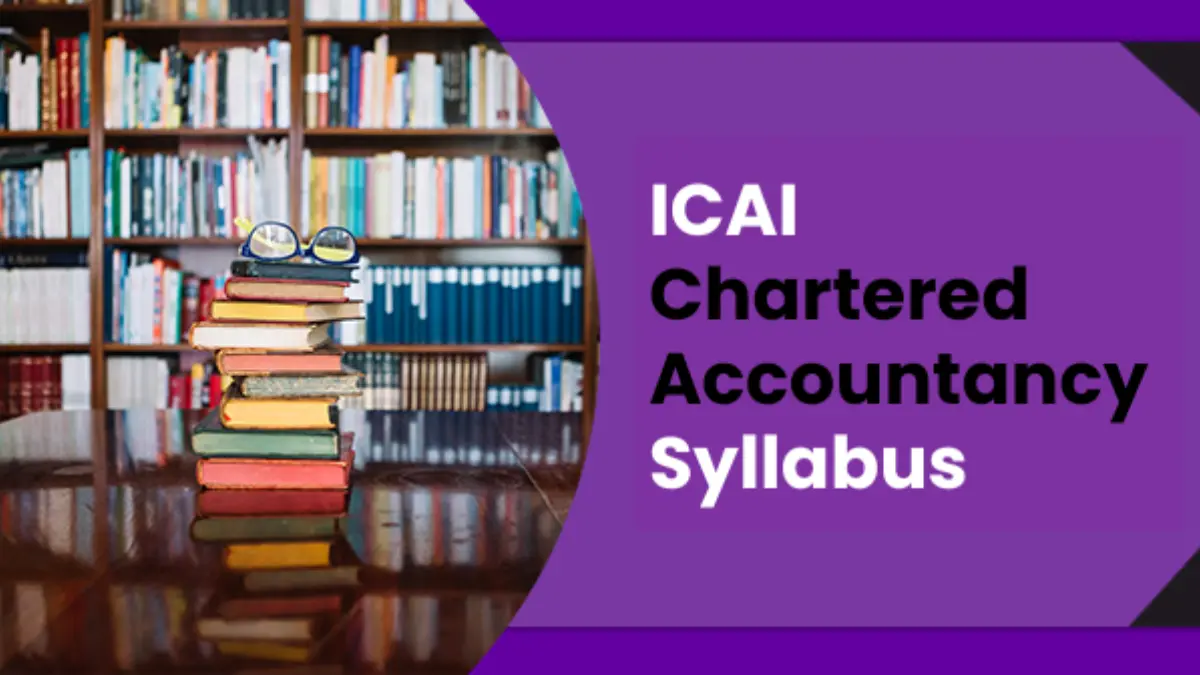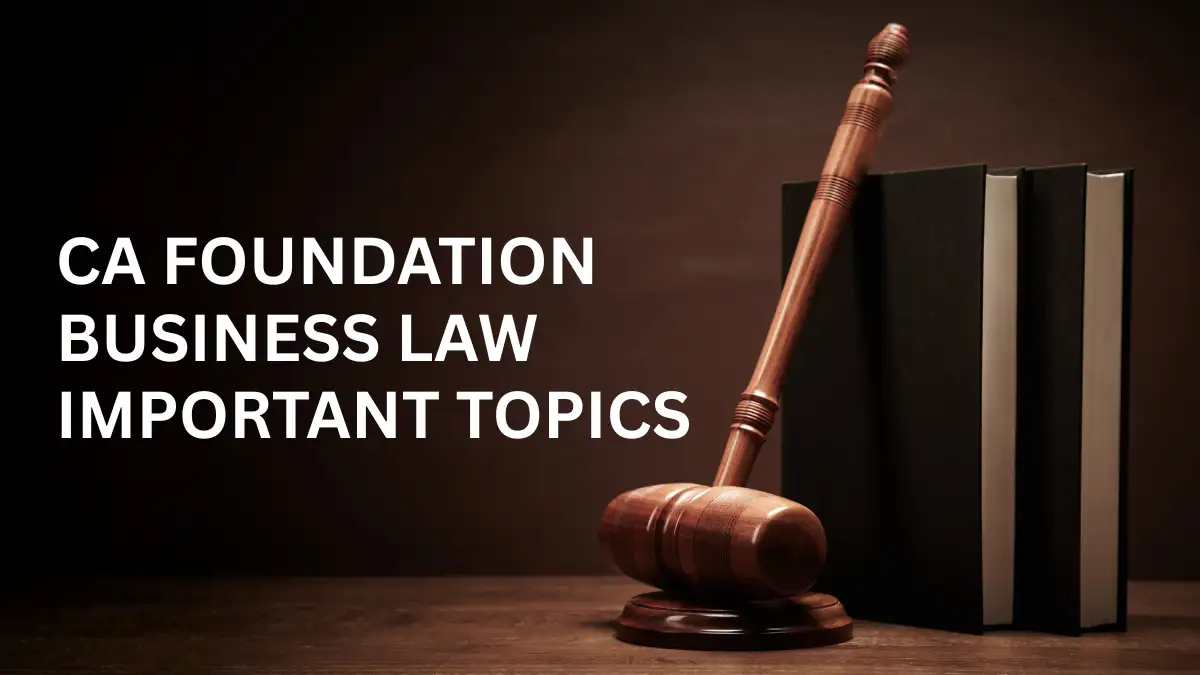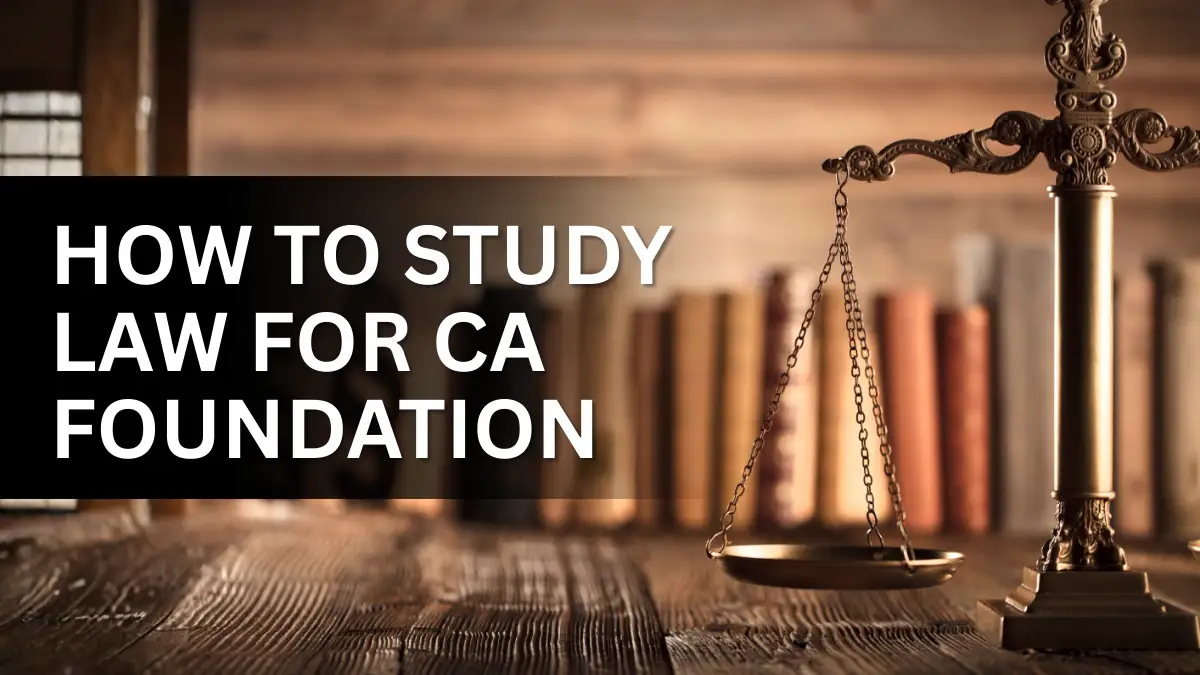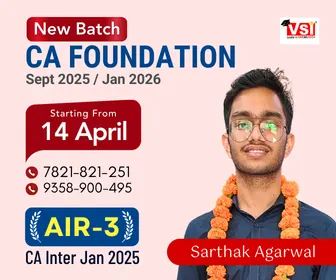Hello Friends, Are you searching for the CA syllabus or subjects? Then read this article, and we will provide you with the whole syllabus for the chartered accountancy course. But first, let me give you a short introduction to this course. The whole CA syllabus is divided into three stages. The Entrance level is CA Foundation which is very basic and contains almost a syllabus that you have already gone through in your senior secondary classes. However, the other two levels CA Intermediate and CA Finals contain a very vast syllabus of ca course. At every stage, you will read an advanced version of its core subjects.
CA Syllabus- Course Highlight
| Course Name | Chartered Accountant or CA |
| Minimum Eligibility | 10+2 with 50% |
| Levels of CA | CA Foundation, CA Intermediate, CA Final |
| Top Recruiting Companies | E&Y, KPMG, Deloitte, PwC, Morgan Stanley, Axis Bank |
| Mode of Exam | Offline |
| Official Website | icai.org |
CA Course
Eligibility Criteria
- For opting for CA or Chartered Accountant, students must have cleared 10+2 examinations.
- Students must have scored a minimum of 55 percent marks (aggregate) to be eligible for CA courses.
CA Course Structure
The CA course is divided into three levels. They are:
- CA Foundation
- CA Intermediate/IPCC
- CA Final
CA Syllabus
Students can download the ICAI CA syllabus pdf from the link given below. CA course syllabus available here is from the ICAI. The syllabus of ca course is separated into three levels. Students must go through the CA full syllabus given below.
CA Foundation Syllabus
| CA Syllabus For Accounting | Link |
| CA Syllabus For Business Law | Link |
| CA Syllabus For Quantative Aptitude | Link |
| CA Syllabus For Business Economics | Link |
CA Inter Group 1
| CA Inter Advance Accounting Syllabus | Link |
| CA Inter Corporate & Other Law Syllabus | Link |
| CA Inter Taxation | Link |
CA Syllabus For Inter Group 2
CA Syllabus For Final Group 1
CA Syllabus Group 2 Final
| Direct Law Taxation & International Taxation | Link |
| Indirect Tax Laws | Link |
| Intergraded Business Solution | Link |
CA Foundation Syllabus And Subjects 2026
Let’s Start with the entrance test i.e. CA Foundation. This comprises of Four Subjects given as follows:-
Below are all the CA Foundation Syllabus and Sub
CA Syllabus For PAPER – 1 Principles and Practices of Accounting
The First Subject at this level is Principle and Practices of Accounting. This is the core subject of this Course. This subject really get advanced with the increase in the levels of CA Course. At the Foundation level it includes the topics like –
- Theoretical Framework
- Accounting Process
- Preparation of Trial Balance
- Rectification of Errors etc,
- Bank Reconciliation Statements
- Inventories
- Concepts and Accounting for Depreciation
- Accounting for Special Transactions
- Final Accounts of Sole Proprietors
- Partnership Accounts
- Financial Statements of Not-For-Profit Organizations.
- Introduction to the Company Accounts
CA Syllabus For PAPER -2 Business Laws and Business Correspondence and Reporting
SECTION – A Business Laws
This is a new subject for the candidates who are appearing in the CA Foundation after giving the 12th Examinations. The object of this subject is to develop the basic understanding of the General Business Laws and also understand their application in the business.
CONTRACTS COVERED BY THIS SUBJECT-
- The Indian Contract Act, 1872
- The sale of Goods Act, 1930
- The Indian Partnership Act, 1932
- The Limited Liability Partnership Act, 2008
- The Companies Act, 2013
At this level, you will have a basic knowledge of the General contracts which is very important to apply these laws in your work. The further next levels will contain a detailed understanding of this subject and a depth knowledge of the Companies Act, 2013 which is replaced by Companies Act, 1956.
CA Syllabus For PAPER – 3 Business Mathematics, Logical Reasoning and Statistics
SECTION – A Business Mathematics
If you were a maths student in your senior secondary classes then you are familiar with these topics.
Topics covered are-
- Ratio and Proportion, Indices and Logarithms
- Equations and Matrices
- Linear Inequalities with Objective Functions and Optimization w.r.t. objective function.
- Time value of Money
- Permutations and Combinations
- Sequence and Series
- Sets, Relations, and Functions
- Basic applications of Differential and Integral calculus
SECTION – B Logical Reasoning
The objective of this subject is to develop basic logical reasoning skills and scoring subjects for all category students whether Maths or Non-Maths.
- Number series, Coding and Decoding and odd man out.
- Direction Tests
- Seating Arrangements
- Blood Relations
SECTION – C Statistics
Maths students in their senior secondary classes have gone through all these topics-
- Statistical description of Data
- Measures of Central tendency and Dispersion
- Probability
- Theoretical Distributions
- Correlation and Regression
- Index Numbers
CA Syllabus For PAPER – 4 Business Economics and Business and Commercial Knowledge
SECTION – A Business Economics
Develop an understanding of basics of Business Economics and apply such basic concepts in simple problem solving.
Topics covered in this section includes-
- Introduction to Business Economics
- Theory of Demand and Supply
- Theory of Production and Cost
- Price Determination in Different Markets
- Business Cycles
These are the four subjects covered in CA Foundation. The above two subjects will get wide with the increase in the levels and their paper is also subjective . However the later two papers will be objective and negative marking is also there in case of objective papers. For each wrong answer ¼ marks will get deducted and for each correct answer 1 mark will be given.
Important Links
- 10 Secrets to Sure Shot Success in CA Foundation
- ICAI CA Foundation Registration & Eligibility Criteria
- How to Score High Marks in CA Foundation Exam
- CA Foundation Study Material
- CA Foundation Question Papers
CA Intermediate Syllabus
This is the second stage in the CA Journey. The course is very vast. And it’s really difficult to cover the entire course but not difficult. The CA intermediate syllabus comprises of eight subjects divided into two groups each of 4 subjects-
| Paper No. | Name of the Subject | Parts of Subject |
| Paper 1 | Accounting | |
| Paper 2 | Corporate Laws & Other Laws | Part I: Corporate LawsPart II: Other Laws |
| Paper 3 | Taxation | Section A: Income Tax LawSection B: Indirect Tax Laws |
| Paper 4 | Cost & Management Accounting | |
| Paper 5 | Auditing and Assurance | |
| Paper 6 | Financial Management & Strategic Management | Section A: Financial ManagementSection B: Strategic Management |
Group – 1 Papers
PAPER – 1 Advanced Accounting
As we have already discussed, that this is the core subject of the entire CA syllabus. Application of Accounting Standards and also various other topics to prepare the Financial Statements of various entities.
Topics covered in this Subject are-
- Introduction to Accounting Standards including Ind ASs (IFRS converged standards) and IFRSs; convergence vs adoption; objective and concepts of carve outs.
- Framework for Preparation and Presentation of Financial Statements (as per Accounting Standards)
- Applicability of Accounting Standard
- Presentation & Disclosures Based Accounting Standard
- Assets Based Accounting Standard
- Liabilities Based Accounting Standard
- Accounting Standard Based on Items Impacting Financial Statement
- Revenue Based Accounting Standard
- Other Accounting Standard
- Accounting Standard For Consolidated Financial Staement
- Financial Statements Of Companies
PAPER -2 Corporate and other Laws
SECTION – A Company Law
To acquire the knowledge of company law and apply the same in audit of Companies or preparation of its Financial Statements. Until you don’t have an idea what is written in the law, you can’t audit a company’s Financial Statement. Basically it covers from Sec 1 to 148 from the Companies Act 2013.
Topics covered in this Section are –
- Preliminary
- Incorporation of Company and Matters Incidental thereto
- Prospectus and Allotment of Securities
- Share Capital and Debentures
- Acceptance of Deposits by companies
- Registration of Charges
- Management and Administration
- Declaration and Payment of Dividend
- Accounts of Companies
- Audit and Auditors
- Companies Incorporated Outside India
- The limited liability Act,2008
Note- Students shall also note that sections of Companies Act, 1956 which are still in force will form part of your syllabus.
SECTION – B Other Laws
Interpretation of various statutes, their rules, develop a basic understanding of these rules.
Laws covered in this section are –
- The General Clauses Act, 1897
- Interpretation of Statutes.
- The Foreign Exchange Management Act.1999
PAPER – 3 TAXATION
As we all know that CA is known as a tax planner. This subject develops an understanding of the Income Tax and Goods and Service Tax prevailing in India.
SECTION – A Income Tax
This section covers topics like-
- Basic concepts
- Residential status and scope of total income
- Income which do not form part of the total income
- Heads of Income and computation of Income under various heads-
- Salaries
- Income from House Property
- Income from Business and Profession
- Capital Gains
- Income from other sources
- Income of other person’s included in total income
- Aggregation of Income, Set off or Carry forward and set off of losses.
- Deduction from the Gross Total Income
- Computation of total income and tax liability of Individuals.
- Advance Tax, Tax deduction at source and Introduction to Tax Collection at Source
- Provisions for filing return of Income and Self Assessment.
- Income Tax Liability-Computation And Optimisation .
SECTION – B Indirect Taxes
As we all know friends that GST replaces the various taxes prevailing in the country. One Nation, One Tax. So, under this Section you will have to study about GST.
Topics covered under this head are-
- GST in India
- Supply Under GST
- Charge of GST
- Place of Supply
- Exemption From GST
- Time of Supply
- Value of Supply
- Input Tax Credit
- Registration
- Tax Invoice: Credit and Debit Note
- Accounts & Records
- E-Way Bill
- Payment of tax
- Tax Deduction at sources & Collection of tax at sources
- Returns
This is the entire syllabus of Group – 1 in Intermediate.
Group – 2 Papers
PAPER – 1 Cost & Management Accounting
Develop an understanding of the Cost Accounting Statements, calculation of the cost associated with the production of a product, preparation of cost accounting statements.
Topics covered under cost and management accounting are-
1.Introduction to Cost and management Accounting
2.Material Cost
3.Employee Cost
4.Overheads: Absorptions and Costing Methods
5.Activity Based Accounting
6.Cost Sheet
7.Cost Accounting System
8.Unit and Batch Costing
9.Job Costing and Contract costing
10.Process and Operation Costing
11.Joint Product And By Product
12.Service Costing
13.Standard Costing
14.Marginal Costing
15.Budget & Budgetary Control
PAPER – 2 AUDITING AND ASSURANCE
As we all know that audit is the basic work of a Chartered Accountant. This subject helps in developing an understanding of the concept in auditing and generally accepted auditing procedures, techniques and skills and acquire the ability to apply the same in Audit and Attestation work.
Topics covered in this subject are as follows –
- Nature, Objective, and Scope of Audit.
- Auditing Concepts.
- Standard Setting Process.
- Engagement Standards
- Audit Strategy, Audit Planning, and Audit Programme.
- Audit Evidence
- Audit of Items of Financial Control.
- Audit Documentation.
- Completion and Review.
- Audit Report.
- Special Feature of Audit of different types of entities.
- Audit of Banks.
- Ethics and terms of audit engagement
- Scope And Objective of Financial Management
- Types of Financing
- Financial Analysis And Planning-Ratio Analysis
- Cost of capital
- Financial Decisions-Capital Structure
- Financial Decisons-Leverages
- Investment Decisions
- Dividend Decisions
- Management of working capital
- Introduction to Strategic Management.
- Strategic Analysis: External Environment
- Strategic Analysis : Internal Environment.
- Strategic Choices.
- Strategy Implementation and Evaluation .
- CA Intermediate Registration and Eligibility Criteria
- CA Intermediate Study Material
- CA Intermediate Papers
- How to Prepare CA Intermediate Exams
- Introduction to Indian Accounting standard
- Conceptual framework for financial reporting under Indian Accounting Standard
- Indian AS on Presentation of General purpose financial statement
- Indian AS on measurement based on accounting principles
- Indian AS on Assets of financial statement
- Indian AS on Liabilities of financial statement
- Indian AS on impacting the financial statement
- Indian AS on disclosures of financial staement
- Other Indian Accounting Standard
- Accounting and reporting of financial instruments
- Business Combination
- Consolidated and separate financial statement of group entities
- India AS 101 First time adoption of Ind AS
- Analysis of financial statement
- Professional and ethical duty of a chartered accountant
- Accounting and technology
- Financial Policy and Corporate Strategy.
- Risk Management.
- Advanced Capital Budgeting Decision
- Security Analysis.
- Security Valuation
- Portfolio Management.
- Securitization
- Mutual Funds
- Derivatives Analysis and Valuation.
- Foreign Exchange Exposure and Risk Management.
- International Financial Management.
- Interest Rate Risk Management
- Business Valuation
- Mergers, Acquisition and Corporate Restructuring.
- Startup Finance
- Quality Control
- General Auditing Principle And Auditor’s responsibilities
- Auditing, Planning and auditor’s responsibilities
- Auditing planning, strategy and execution
- Materiality, Risk Assessment and Internal Control
- Audit Evidence.
- Completion & Review.
- Reporting.
- Specialised Area
- Related Services.
- Review of financial information
- Prospective Financial Information and other assurance services.
- Group Audit.
- Overview of Audit of public sector undertaking.
- Internal Audit.
- Due Diligence, Investigation & Forensic Accounting .
- Sustainable Development Goals & Environment , Social and Governance Assurance
- Professional Ethics & Labilities of auditor
Group – 2 Papers . - Basic Concepts
- Income which do not form of total income
- Income of Other Persons included in assesses Total Income
- Profit and gain of business or profession
- Income from House Property
- Profits and Gains of Business or Profession
- Capital Gains
- Income from Other Sources
- Aggregation of Income, Set-Off and Carry Forward of Losses
- Deductions from Gross Total Income
- Assessment of Various Entities
- Assessment of trust and institutions, political parties and other special entities
- Tax Planning, Tax Avoidance & Tax Evasion
- Taxation of digital transactions
- Deduction, Collection and recovery of tax
- Income tax authorities
- Assessment Procedure
- Dispute Resolution
- Miscellaneous Provisions
- Provisions to counteract unethical tax practices
- Non resident taxation
- Double taxation relief
- Advance Ruling
- Transfer Pricing
- Fundamental of BEPS
- Application and Interpretation of tax treaties
- Overview of model tax conventions
- Latest Development in international taxation
- Goods and Service Tax
- Customs & FTP
- Supply Under GST
- Charge of GST
- Exemption From GST
- Place of Supply
- Exemption From GST
- Time and Value of Supply
- Input Tax Credit
- Registration
- Tax Invoice, Credit and Debit Notes
- Accounts and Records; E-way Bill
- Payment of Tax
- Returns
- Import And Export Under GST
- Refunds
- Job Work
- Assessment And Audit
- Inspection, Search, Seizure And Arrest
- Demands And Recovery
- Liability to Pay in Certain Cases
- Offences And Penalties
- Appeals And Revisions
- Advance Ruling
- Miscellaneous Provisions
- To develop an understanding of the customs laws and acquire the ability to analyze and interpret the provisions of such laws.
- To develop an understanding of the basic concepts of foreign trade policy to the extent relevant to indirect tax laws and acquire the ability to analyze such concepts.
- Levy of and Exemptions from Customs Duty
- Types of Duty
- Classification of Imported and Export Goods
- Valuation under the Customs Act, 1962
- Importation, Exportation and Transportation of Goods
- Warehousing
- Duty Drawback
- Refund
- Foreign Trade Policy
- You must have a daily study routine.
- Take online classes.
- Practice and reading should go hand in hand.
- Make a habit of making notes.
- Solve mock test papers.
- Accounting
- Business Laws
- Quantitative Aptitude
- Business Economics
- Advanced Accounting
- Corporate and Other Laws
- Taxation
- Coast and Management Accounting
- Auditing and Ethics
- Financial Management and Strategic Management
- Financial Reporting
- Advanced Financial Management
- Advanced Auditing, Assurance and Professional Ethics
- Direct Tax Laws and International Taxation
- Indirect Tax Laws
Paper 3 – Financial Management And Strategic Management
SECTION – Financial Management
Develop an understanding of various aspect of financial management and acquire the ability to implement this knowledge in decision-making
Topics covered in the above section are as follows –
SECTION – B Strategic Management
To develop an understanding of the Strategic Management concepts and techniques and acquire the ability to apply the same to business situations.
Topics covered by this section are as follows-
This is the entire syllabus at the Intermediate Level of the CA Course.
Important Links
CA Final Syllabus
The last level in this journey is CA Final. The course of the CA Final syllabus is divided into eight subjects and these eight subjects are further divided into two groups. One of the paper from the eight papers is elective. Students are given a number of subjects from which they can opt a subject.
At the time of registration for the final course, you have to opt for a subject from the elective paper. Other subjects are mandatory for all.
These subjects are based on the new syllabus introduced by the ICAI.
Group – 1 Papers
PAPER – 1 FINANCIAL REPORTING
Detailed study of Accounting Standards, IND AS , Guidance Notes and to acquire the ability to integrate and problem solving in practical scenarios based on the AS, IND AS. Their appropriate treatment and formulate the accounting policies.
Topics covered in this subject at the Final level are-
Develop an understanding of the various forms of reporting and accounting for special transactions and apply such knowledge in problem solving.
PAPER – 2 Advanced Financial Statement
The objective behind this subject is to acquire the ability to apply the Financial Management theories and techniques in Strategic Decision Making.
Topics covered under this subject are as follows –
PAPER – 3 ADVANCED AUDITING ,Assurance AND PROFESSIONAL ETHICS
The third paper comes in this queue is Adv. Auditing and Professional Ethics. The objective behind this subject is to acquire the ability to analyse the current business practices and procedures and apply them in auditing engagements.
Topics Covered in this Subject are as follows-
PAPER – 7 DIRECT TAXATION AND INTERNATIONAL TAXATION
OBJECTIVE
To acquire the ability to analyse and interpret the provisions of direct tax laws and recommend solutions to practical problems.
Topics Covered –
PAPER – 8 INDIRECT TAX LAWS
It consists of two parts –
To acquire the ability to analyze and interpret the provisions of goods and services tax law and recommend solutions to practical problems.
Topics Covered –
SECTION – B Customs & FTP
OBJECTIVE
Topics Covered –
This is the whole syllabus of the Chartered Accountancy Course
Paper 3 : Integrated Business Solution
Objective
Important Links
Frequently Asked Questions
Q1. What are the eligibility criteria for becoming a Chartered Accountant?
Ans: To become a CA one must have to clear all the levels of CA i.e., CA foundation, CA intermediate, and CA final along with CA Articleship. To be eligible for the CA course, one must have to clear the 10+2 examinations with 50% marks in the commerce stream and 55% marks in the science stream. To the eligibility criteria of all three levels, students can read our detailed blog of CA course guide.
Q2. What is the salary of a Chartered Accountant?
Ans: The salary of a Chartered Accountant varies on their working experience. A Chartered Accountant can earn up to 20 lakhs or 25 lakhs per annum.
Q3. How can I prepare for CA exams?
Ans: CA exams are not easy. You need to study well to clear the CA exams in one attempt. Given below are the following steps which will guide you to prepare well for the exams.
Q4. What is the new syllabus of CA Foundation Papers 2024?
Ans: The CA Foundation level is the first level of the CA course. The new syllabus for this level includes:
Q5. What is the new syllabus of CA Intermediate?
Ans: The CA Intermediate level is the second level of the CA course. The new syllabus for this level includes:
Q6. What is the new syllabus of CA Final?
Ans: The CA Intermediate level is the second level of the CA course. The new syllabus for this level includes:









